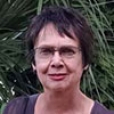When I got my "power port" removed this fall, I was reminded of the four-plus years ago when it all began. So, the first bulleted part of this blog is me dredging up the sequence and brutal circumstances. The second part, is the uphill climb that made it all worthwhile.
- People always ask what led up to diagnosis. I believe a case of sudden-onset diabetes was a precursor: I had fallen, damaged my sciatic nerve, was given a steroid regimen, and was suddenly diabetic. I soon controlled it by diet only. But a year later, my blood sugar readings moved up. A blood test panel showed several out-of-normal readings, and fortunately, my doctor sent me for tests and scans that revealed the cancerous tumor.
- I was one of few whose cancer had not spread and was eligible for Whipple surgery. The Froedtert team was especially skilled in the surgery and newest protocols. I had chemo prior to surgery; surgery; more chemo; and radiation--all over a period of almost 8 months.
- In my case, they studied my biopsy tissue more closely to select the chemo "cocktail." Before surgery, it was three, and after, it was a four-chemo mix.
- The surgery and time in hospital was 11 days; they had predicted 10-12. They want your digestive tract to begin to accept nourishment. When the docs asked if I had gone to the bathroom after a few days, I said, "It's hard to build a poop on a cup of tomato soup," and they replied, "You'd be surprised!"
- The second round, particularly, was very harsh, and it's said that people drop out at times. Having head-to-toe reactions is not easy: Hair can drop out; throats are raw; skin may peel right down your fingers; diarrhea; upset stomach and more can occur. One of the ingredients even made it impossible to hold or drink cold water for a few days after each treatment; I wore gloves to reach into the refrigerator; heated food and drank tepid water.
- I had a feeding tube, mostly at night, for several months. Food was tasteless for some time; I used to say things tasted like cardboard.
- I lost weight and my pants fell down a few times as I crossed the room. My fiancé, a loving helper-partner, kidded about that! But I did get some new clothes out of that circumstance.
Life began to offer more than going back to what I once was. Sure, I gained some new wrinkles and cannot do everything again. Instead, I appreciate:
- I eat and sleep better now, and I learned techniques to relax and find dreams. After having tubes and lines sticking out of everywhere, appreciation of a cozy bed where you can turn over and fluff your own pillow is huge.
- Food is wonderful now. Even though some of us have to watch carbs and fats very closely, I can still make a great pumpkin pie and sumptuous turkey soup that everyone devours. Chosen fruits and virtually all vegetables are prized. (Initially, I watched out for certain raw fruits and veggies and cooked them instead.)
- Walking, gardening and swimming are all go-to activities. More recently, snorkeling on vacation and biking make watching scenes and sea-sides precious. Ongoing hobbies, from photography to writing for some specialty magazines make me set goals for making a small impact.
- Best of all, I was able to be right there to see my priceless, wonderful son get married. In addition, re-reading his notes to me when ill, and when relatively well now, have amazed me and enriched my life immeasurably.
My attitude takes me beyond the past now. Increasingly, for many, a life on the other side of pancreatic cancer lies out there. We won't turn our backs on it, but we will also move forward.

About the Author
Born in Dubuque, Iowa, Susan Stansbury was raised in Michigan's Upper Peninsula where her little bedroom window overlooked Little Bay de Noc off of Lake Michigan. After working in Chicago for a couple of years out of college, Susan moved back to Wisconsin. "Little did I realize this would mean a career in industry," she says. She joined some companies where she was the first woman in marketing management. She often worked on medical disposable products such as transdermal patches and antibacterial wet wipes. In 2002, Susan left the corporate world to work for herself helping small businesses with marketing needs from business plans, to research, photography and promotions. She gave speeches to industry groups in the United States and occasionally in Europe about topics like sustainability and packaging. With her clients' participation, she developed a manufacturers' expo, which she recently sold, at Green Bay's Lambeau Field Atrium. She writes an occasional article for industry magazines. Increasingly, however, her writing and photography are personal projects. Susan was diagnosed in 2014 with pancreatic cancer.
